The council of the Me-da-we initiators partook of the
spirit of the Ten Commandments that were given to the children of Israel,
amidst the thunders of Mount Sinai. There was consequently less theft and
lying, more devotion to the Great Spirit, more obedience to their parents,
and more chastity in man and women, than exist at the present day, since
their baneful intercourse with the white race. Even in the twenty years'
experience of the writer, he has vividly noticed these changes, spoken of by
the old men, as rapidly taking place. In former times there was certainly
more good will, charity, and hospitality practised toward one another; and
the widow and orphan never were allowed to live in want and poverty. The old
traditionists of the Ojibways, tell of many customs which have become nearly
or altogether extinct. They dwell with pleasure on this era of their past
history, and consider it as the happy days of "Auld lang syne."
I have already stated that they located their town on the
island of La Pointe, for greater security against the harassing inroads of
their enemies, but though the island is located at its nighest point, about
two miles from the main shore of the Great Lake, yet were the Ojibways not
entirely secure from the attacks of their inveterate and indefatigable foes,
who found means, not only of waylaying their stray hunters on the main
shore, but even to secure scalps on the island of their refuge itself. On
one occasion a war party of Dakotas found their way to a point of the main
shore directly opposite the western end of the island, and during the night,
two of their number crossed over, a distance of two miles and a half, each
swimming by the side of a log, and attacked a family who were fishing by
torchlight along the eastern shore of the island.
With four scalps, and the canoe of those they had killed,
they returned to their friends, who immediately retreated, satisfied with
their success. Early in the morning, the mangled bodies of the slain were
discovered, and the Ojibways, collecting their warriors, made a long but
unavailing pursuit.
Shortly after this occurrence, a party of one hundred and
fifty Dakota warriors again found their way to the lake shore, and taking a
position on the extreme point of Shag-a-waum-ik-ong, immediately opposite
the Ojibway village, they laid in ambush for some stray enemy to come within
their reach. Shag-a-waum-ik-ong is a narrow neck or point of land about four
miles long, and lying nearly parallel to the island of La Pointe, toward the
western end of which it converges, till the distance from point to point is
not more than two miles. In former times the distance is said to have been
much less, the action of the waves having since gradually washed away the
sand of which it is composed.
It lies across the entry to a deep bay, and it has derived
its name from the tradition that Man-ab-osho created it to bar the egress of
a great beaver, which he once hunted on the Great Lake, and which had taken
refuge in this deep bay. The name signifies" The soft beaver dam," as the
great beaver had easily broken through it, making the deep gap which now
forms the entry of the bay. This point or peninsula does not average in
width more than twenty rods, and in many places it is not more than six rods
across. It is covered with a growth of scrubby oak and pine, and the extreme
end where the Dakotas lay in ambush, is said in those days to have been
covered with numerous sand hillocks, which the winds and waves have since
nearly blown and washed away.
Early one morning, two Ojibway lads crossed over to the
point to hunt ducks: on landing they were attacked by the ambushed war party
of the Dakotas with loud yells. For some time the two youths, protected by
the numerous sand-hills, defended themselves, and evaded the attempts of
their enemies, who wished to take them captives. In the mean time, the
Ojibway town being aroused by the distant yelling, and seeing the point
covered with the forms of numerous men, the startling try of Aboin-ug!
Aboin-ug! was shouted from wigwam to wigwam, and the men of war, grasping
their bows and arrows, spears and war-clubs, jumped into their canoes and
paddled with great speed to the scene of action. They crossed over in two
divisions, one party proceeding straight to the point where the Dakotas were
still to be seen hunting the two lads, while the other party living at the
lower end of the great village, crossed over to that portion of the
peninsula lying nearest to their wigwams. These landed about two miles below
the extreme point, and taking their position where Shag-a-waum-ik-ong is but
a few rods wide, and covered with scrubby oaks, they entirely cut off the
retreat or egress of the Dakotas. Meanwhile the two unfortunate boys had
been dispatched and scalped; but their friends who had crossed straight over
from the village, landed on the point and proceeded to revenge their death,
by bravely attacking the now retreating Dakotas. These being pressed by an
enemy increasing in numbers every moment, turned their backs and fled down
the point, merely keeping up a running fight, till they were met by the main
body of the Ojibways who had collected in their rear, and cut them off
effectually from escape. Discovering, too late, the fearful position, which
their rashness and want of foresight had brought them to, the Dakota
warriors took shelter in a thick grove of scrubby oak, and fought to the
last gasp. Overwhelmed by numbers, all were killed but two, who were seen to
throw themselves into the lake and swim off towards the opposite shore of
the deep bay. They were never heard of afterwards, but the probability is
that by swimming two miles to the nearest point of the main shore, they
saved their lives, and returned to their people with the sad tale of the
almost total destruction of their war party. Over the whole point of Shag-a-waum-ik-ong,
are still strewn small particles of bones, which are said to be the remains
of the warriors who fell in this bloody fight.
An anecdote is told of an old man, who was the father of
one of the lads waylaid by the ambushed party on the point. He was not at
home when the alarm was first sounded, and when he arrived, the warriors had
all gone, and taken all the canoes belonging to the village. Burning to know
the fate of his beloved child, he lashed his weapons of war to his back, and
notwithstanding the entreaties of the women, he threw himself into the lake,
and swam over to the scene of action. He arrived too late to join in the
fight, but he was ever afterward noted for this almost superhuman feat, and
his name is preserved amongst his people even to this day.
On another occasion a party of four hundred Fox warriors
floated down the Ontonagun River in their small inland bark canoes, and
coasting along the lake shore, they landed in the night time on the island
of La Pointe, and at early dawn in the morning, they succeeded in waylaying
and capturing four young women who had gone from the village to cut wood.
The spot is pointed out to this day, where they were taken. The Foxes
satisfied with their success, hastily retreated to their canoes, and under
cover of a dense fog, they silently paddled homeward. Confident, however, in
their numbers, and full of exultation at having bearded their enemies even
on the island of their refuge, feeling also secure of escape in the fog,
when still within hearing distance of the Ojibway village, they yelled back
the whoop of derision and defiance, and commenced singing a stirring scalp
song.
The town of the Ojibways became instantly a scene of
commotion, and the eager warriors quickly arming themselves, hastily
embarked in their large lake canoes, and silently but swiftly pursued their
enemies under cover of the dense fog.
The lake was perfectly calm, and they could hear the loud
talking and laughter of the Foxes from a long distance. Guided by the noise
thus kept up by their careless and confident enemies, the Ojibways silently
straining on their paddles gradually neared them. By the wise advice of
their leaders, they deferred the attack, till the Foxes had arrived opposite
the rock-bound coast one mile below Montreal River, and twenty-two miles
from La Pointe, where the steep and slippery banks would prevent them from
making their escape by land. Here the Ojibways fell on them with greatfury,
and easily upsetting their small canoes, they dispatched the surprised and
now fear Stricken Foxes as they struggled in the water. They killed and
drowned this large war party, nearly to a man.
This is the only naval engagement in which the Ojibways
tell of ever having been engaged; and their great success on this occasion,
they attribute not only to superior numbers, but to the great advantage
which they possessed in the size of their canoes, compared with those of the
Foxes. Theirs were made large and strong, sitting firmly on the water, made
to withstand the storms of Lake Superior, and capable of holding from five
to twenty men each, while on the other hand, the canoes of their enemies,
though made of the same material (birch bark), were constructed frail and
crank, made to be taken across long portages on a man's head, and capable of
containing but two or three persons. These, therefore, were easily upset,
and their owners struggling in the deep water, were easily knocked on the
head with war-clubs.
These two successful battles materially strengthened the
foothold, which the Ojibways had obtained in this portion of the Lake
Superior country. The Dakotas and Foxes received thereby a check on their
war propensities, and they learned to respect the prowess and bravery of the
Ojibways. Their war parties to the lakeshore became less frequent than
formerly, and they were more cautious in their attacks. On the island of La
Pointe, they never again secured scalp nor prisoner, for never again did
they dare to land on it.
The war carried on at this period between the Ojibways and
Foxes, was fierce and bloody in the extreme, and it was marked with every
cruelty attendant on savage warfare. The Foxes tortured their captives in
various ways, but principally by burning them by fire. Of old, the Ojibways
did not practice these cruelties, and they only learned them at this period
from the Foxes. The hellish custom of torturing prisoners with fire,
originated amongst them as follows:--
"A noted warrior of the Ojibways was once taken prisoner by his own nephew,
who was a young warrior of the Foxes, son of his own sister, who had been
captured when young, adopted and married in this tribe. This young man, to
show to the Foxes his utter contempt of any ties of blood existing between
him and his Ojibway uncle, planted two stakes strongly in the ground, and
taking his uncle by the arm, he remarked to him that he 'wished to warm him
before a good fire.' He then deliberately tied his arms and legs to the two
stakes, as wide apart as they could be stretched, and the unnatural nephew
built a huge fire in front of his uncle. When he had burnt his naked body to
a blister on this side, he turned him with his back toward the fire, and
when this had also been cruelly burned, he untied him, and turning him
loose, he bade him to 'return home and tell the Ojibways how the Foxes
treated their uncles.'"
The uncle recovered from his fire wounds, and in a
subsequent war excursion, he succeeded in capturing his cruel nephew. He
took him to the village of the Ojibways, where he tied him to a stake, and
taking a fresh elk skin, on which a layer of fat had purposely been left, he
placed it over a fire till it became ablaze; then throwing it over the naked
shoulders of his nephew, he remarked. "Nephew, when you took me to visit the
village of your people, you warmed me before a good fire. I now in return
give you a warm mantle for your back."
The elk skin, covered with thick fat, burned furiously,
and "puckering," it tightened around the naked body of his nephew--a
dreadful "mantle" which soon consumed him. (It is not unnatural to suppose
that the tale of this occurrence being spread amongst the surrounding
tribes, gave the name of Ojibway--"to roast till puckered up," to this
tribe. Tribes have derived their names from circumstances of lesser note
than this.--Author.) This act was again retaliated by the Foxes, and death
by fire applied in various ways, soon became the fate of all unfortunate
captives.
go to chapter 6
1
- 2
- 3
- 4
- 5
- 6
- 7
- 8
- 9
- 10
11
- 12
- 13
- 14
- 15
- 16
- 17
- 18
- 19
- 20
21
- 22
- 23
- 24
- 25 - 26 - 27 - 28 - 29 - 30
White Eagle Soaring: Dream Dancer of the 7th Fire
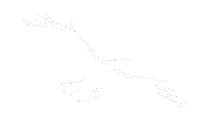
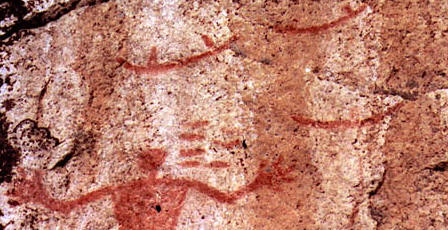
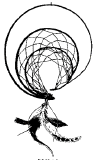
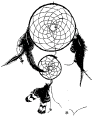
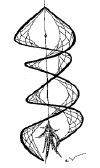


 Get
a course to promote your business online, explode your sales
Get
a course to promote your business online, explode your sales Get
software to promote your business online in less time
Get
software to promote your business online in less time Get
software to streamline your business and run it hands free.
Get
software to streamline your business and run it hands free.